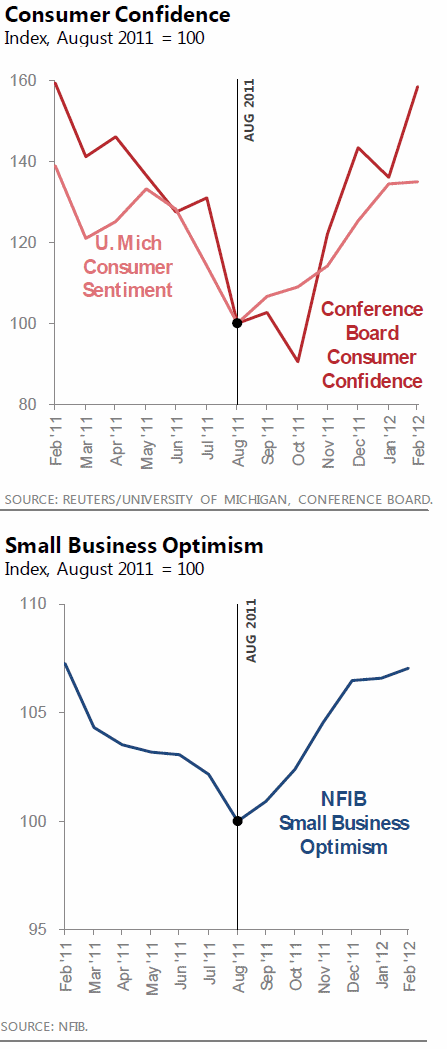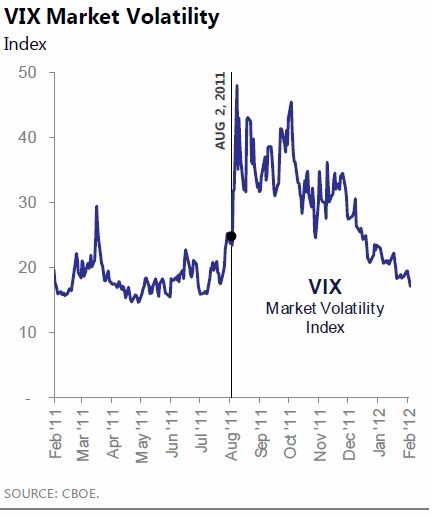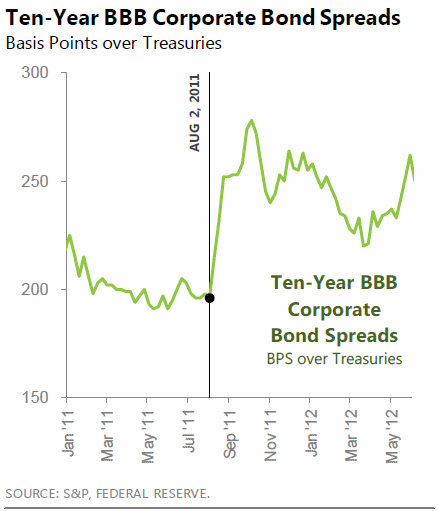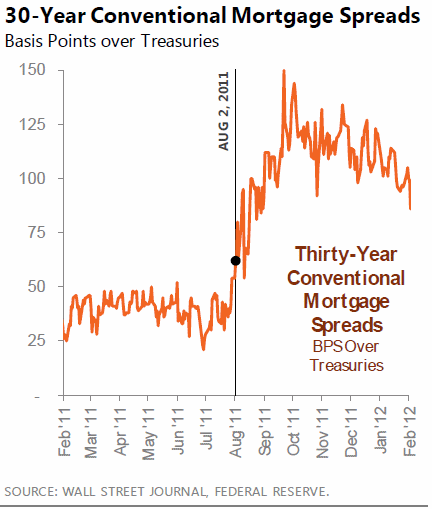The following is an economic "case" made by Treasury for the dangers associated with the debt ceiling brinksmanship. While they do admit that there was more to the story in 2011, it far from an objective report. The reality is that the sovereign debt crisis in Europe and unprecedented shift in FOMC policy were the two primary sources of volatility in the summer of 2011, though the fiscal brinksmanship did play a smaller, yet noticeable role. This report focuses exclusively on the latter.
Economists and others have been warning for weeks that a failure to raise the debt ceiling and the nation's first-time-ever default on its debt would probably result would have a catastrophic outcome. The U.S. Treasury today issued a report, The Potential Macroeconomic Effect of Debt Ceiling Brinksmanship that looks at the possible impact that merely a close call might have on the economy.
An actual default, the report says, could cause credit markets to freeze, the value of the dollar to plummet, and U.S. interest rates to skyrocket, potentially resulting in a financial crisis and recession that could echo the events of 2008 or worse. But an actual failure to raise the ceiling and/or a default aren't the only things that Treasury is worrying about.
"As we saw two years ago, prolonged uncertainty over whether our nation will pay its bills in full and on time hurts our economy," Treasury Secretary Jacob J. Lew said. "Postponing a debt ceiling increase to the very last minute is exactly what our economy does not need - a self-inflicted wound harming families and businesses. Our nation has worked hard to recover from the 2008 financial crisis, and Congress must act now to lift the debt ceiling before that recovery is put in jeopardy."
The Treasury report looks at the events of 2011 when it appeared that Congress might not raise the debt ceiling and the fallout that resulted to determine what might happen if the country comes that close to the cliff again.
Even though Congress did raise the ceiling in August 2011, before the extraordinary efforts of Treasury to shift funds around and delay default were exhausted, the U.S. Debt was downgraded from its historic AAA level, the stock market fell, measures of volatility jumped, and credit risk spreads widened noticeably. These effects persisted for months and while other factors played a role, the debt crisis uncertainty took a toll. This time there is the additional problem of the October 1 government shutdown which, if protracted, could weaken the economy, making it more susceptible to effects of a debt ceiling impasse.
From June to August 2011 consumer confidence fell 22 percent and business confidence by 3 percent.

A good deal of household wealth is held in financial assets, and the S&P 500 index of equity prices fell about 17 percent in the period around the debt limit debate and did not recover until into 2012. About half of US households hold stocks directly or indirectly and between the second and third quarters of 2011 household wealth fell $2.4 trillion. Lower household wealth usually leads to a decline in consumption spending and the loss in stock value reduced retirement savings by $800 billion as well.
Businesses are also affected by stock prices because they rely on both debt and equity financing. When stock prices fall, investment or other spending to expand a business is more costly. The effects on households and businesses, moreover, are reinforcing. Less capacity and willingness of households to spend, when businesses have less incentive to invest, hire, and expand production, all lead to weaker economic activity.
One measure of volatility or uncertainty in financial markets is the VIX which measures the implied volatility of stock prices. The VIX roughly doubled in the summer of 2011 and remained elevated for months. Greater volatility can lead investors to pull back from any investment perceived as risky which can lead to an increase in the cost of borrowing for households and businesses. It can also cause a pullback in spending while individuals and businesses build a cash buffer against feared future adverse developments.

Corporate risk spreads often indicate how willing investors are to lend to nonfinancial corporations and imply a higher cost of borrowing for a given level of Treasury rates. In 2011 corporate risk spreads on BBB-rated corporate debt jumped 56 basis points and the wider spreads persisted into 2012. Again, this was partially due to the European debt crisis and the adverse effect on business was muted a bit because the total cost of borrowing did not rise in line with the wider spreads. With Treasury yields rising this year, widening spreads would lead to an increase in yields on corporate debt. While this is most applicable to large institutions, in times of stress banks tighten terms and loans to small businesses as well.

Like Corporate risk spread, the spread of mortgage rates over Treasury securities reflect investors willingness to finance mortgages which also involve risk. An increase in risk aversion leads to a widening of mortgage spreads and can increase rates for a given level of Treasury leads, raising the cost of buying a home. Higher rates also reduce the efficacy of refinancing to improve cash flow which in turn restrains consumption spending.
In the late summer of 2011 the 30-year fixed-rate conventional mortgage spread jumped by as much as 70 basis points and this lasted again into 2012. At that time concerns over European sovereign debt pushed down Treasury yields so mortgage rates actually declined but if those some widening spreads were to take place now when Treasury yields have been rising, the report speculates the result would be higher mortgage rates that would restrain the housing market and household spending.

Real GDP expanded at a 1.8 percent annual rate in the first half of this year and the consensus forecast of private-sector economists last month was a 2.4 percent acceleration of real GDP in the second half and 2.8 percent further growth in 2014. As the economy strengthens, labor market conditions should also continue to improve. The current shutdown puts that outlook at risk.
Private sector economists have estimated that a one-week shutdown could slow GDP growth in the fourth quarter by over a quarter percentage point with the effect growing with the length of the shutdown, perhaps even throwing the country into recession. "If such projections prove accurate, the weaker-than-expected economic expansion would be even more susceptible to the adverse effects from a debt ceiling impasse than prior to the shutdown."
Further, a protracted debate over the debt ceiling could spark renewed stress in financial markets and a fall in stock prices and wider credit spreads which would depress private sector spending. Increased uncertainty or reduced confidence could lead consumers to postpose purchases and businesses to postpone hiring and investments. The report says a precise estimate of the ultimate effects is impossible and there are different conditions now than two years ago, "Yet economic theory and empirical evidence is clear about the direction of the effect: a large, adverse, and persistent financial shock like the one that began in late 2011 would result in a slower economy with less hiring and a higher unemployment rate than would otherwise be the case."
Indeed there are already some tentative signs that the current debate is affecting financial markets. The price moves are small and could easily reverse but yields on the Treasury bills that mature at the end of October are higher than those maturing shortly before or after. This might suggest concern about the possible delays in those bills being paid. If market participants lose confidence in the country's willingness to pay its bills the adverse effects seen in 2011 could reappear, even push up yields and raise the cost of financing the government's debt and worsen the fiscal position of the government.
The report concludes that should there be a default it could have a catastrophic effect on the financial markets but also on job creation, consumer spending, and economic growth; maybe even leading to events of the magnitude of late 2008. "Considering the experience of countries around that world that have defaulted on their debt, not only might the economic consequences of default be profound, those consequences, including high interest rates, reduced investment, higher debt payments, and slow economic growth, could last for more than a generation."







